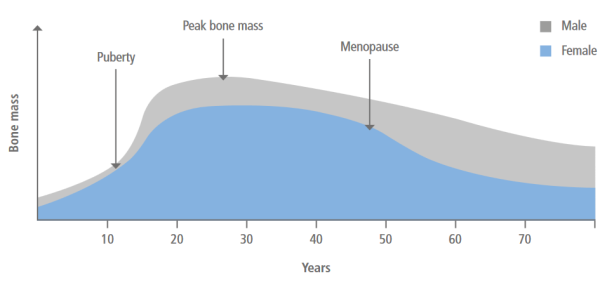You can help prevent osteoporosis by leading a bone healthy lifestyle at all stages of life.
In fact, osteoporosis prevention begins in childhood, when a bone-healthy diet and plenty of exercise helps children achieve their highest possible ‘peak bone mass’. This is important because the more bone mass you have when you reach adulthood, the less likely you are to have weak and breakable bones at older age. Read ‘Building strong bones in children and adolescents’.
For women early prevention is especially important. The diagram below shows how bone loss occurs rapidly after menopause, at around the age of 50, when the protective effect of oestrogen is lost.
What can you do as an adult to prevent osteoporosis?
As an adult, you can do many things to help maintain healthy bones and to avoid premature bone loss. Making simple changes to your diet, taking enough exercise, and kicking bad lifestyle habits will not just help you prevent osteoporosis, but will also benefit your general well-being.
- Ensure a healthy diet which includes enough calcium and protein, two key nutrients for bone health.
- Get enough vitamin D - made in the skin after exposure to sunlight, the average young adult needs about 15 minutes of daily sun exposure. You can boost your vitamin D intake through some foods like oily fish, eggs, mushrooms, and fortified dairy foods or juices.
- Maintain a healthy body weight - being too thin (BMI under 19) is damaging to your bone health.
- Keep active! Take regular weight-bearing and muscle strengthening exercise.
- Avoiding smoking and heavy drinking
- Be aware of your osteoporosis risk factors, and get an early diagnosis, and treatment if needed.
Osteoporosis prevention strategies in seniors
Older adults are at highest risk of osteoporosis, with nearly 75% of hip, spine and wrist fractures occurring in people aged 65 years old or over. The prevention advice listed above applies to all adults, but at older age one should pay special attention to the following:
- Ensuring enough calcium, protein, vitamin D and other nutrients:
With age, your ability to absorb vitamins and minerals may be reduced. In fact, older adults often suffer from malnutrition as they may not be eating enough and getting enough protein and vitamins in their diets. A calcium and vitamin D supplement should be considered when dairy consumption is low, and little time is spent outdoors. - Participating in exercise activities that improve balance, posture, coordination, and muscle strength: as we age we lose both bone and muscle mass faster so exercise becomes even more important. In addition to regular weight-bearing physical activity, older adults should choose exercises which help improve balance and muscle strength.
- Be cautious about preventing falls, inside the home and out.
- Ask a doctor for a bone health assessment, especially if risk factors for osteoporosis have been identified (see risk factors or take our Osteoporosis Risk Check).
